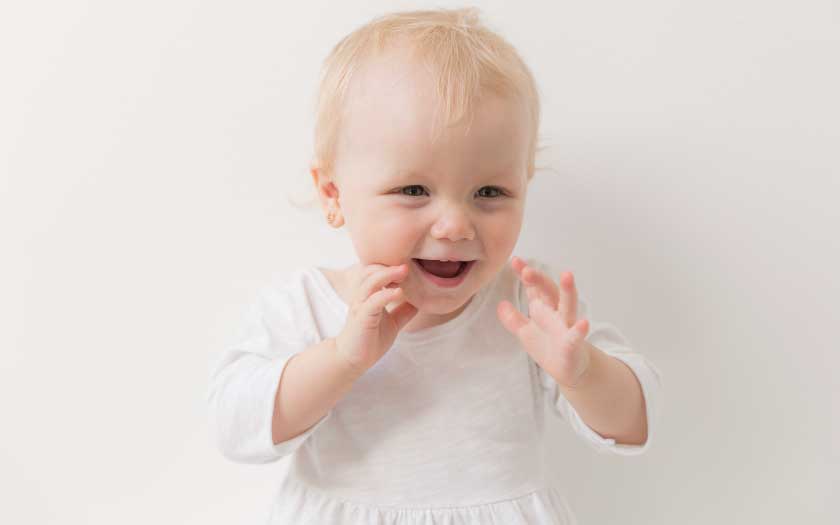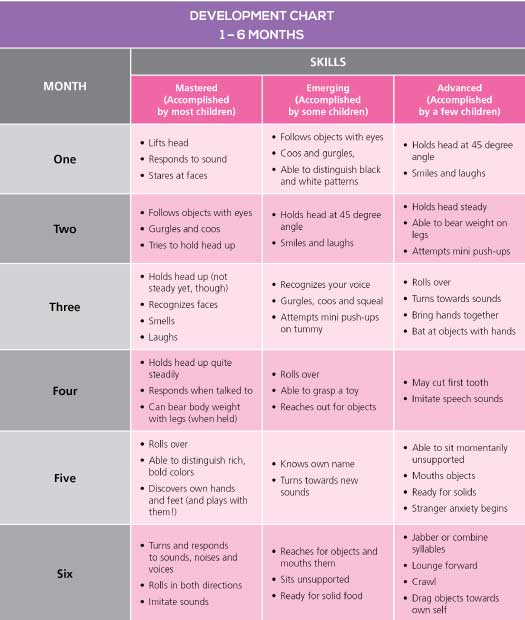Watching a baby reach certain milestones in life is something! From the time they are born, babies tend to grow and develop at an unbelievable rate. Parents have to keep in mind though, that no two babies are exactly alike and some babies develop at a different pace compared to their peers.
Here, we present a guide on what to expect in terms of milestones during the first three years of a baby’s life. Note: Premature babies (born before 37 weeks of pregnancy), may achieve development milestone a little differently, based on his or her due date and not a birthday. So if your baby was born two months early, milestones will probably be achieved two months later than the predicted times on this guideline.
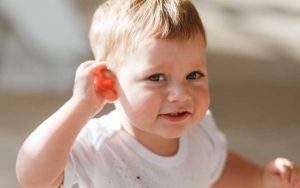
Newborns’ hearing is tested shortly after birth but you can ask your doctor to check your baby’s hearing later on if you have any concerns. Unless there is hearing impairment, your baby is born with fully developed hearing.
By the fourth week, a baby can pay close attention to voices, especially high-pitched ones, and will respond to familiar sounds. By three months many babies will seem to be looking directly at their parent or caregiver, and may even seem to be trying to communicate with them.
At five months most babies will start to realize that sounds are coming from a certain direction and will turn to find them! Five-month-old babies will begin to recognize their names and get all excited when they hear it being called.
If your baby is under three months try this to test his or her hearing: Clap your hands behind your baby’s head. If you get a startling reaction, your little one’s hearing is fine! If there is no response the first time, try again a few more times. For babies four to six months old, call out their name, and watch for a reaction. A child between six to ten months should also respond and turn to look at the direction of sounds like a door-bell, a ringing phone, and so on.
For older children, you may ask them to point out familiar persons or objects. If they don’t or can’t it could be because they can’t hear you.
Trust your instinct and talk to your baby’s doctor if there is any cause for concern. The earlier babies are checked for hearing problems, the better their chances of catching up on developmental milestones with the help of hearing aids and other treatments.
Eyesight
Babies may have sharp hearing, but they’re born with a somewhat blurry vision that can pick up the sight of only certain shapes and movement from birth. They may not be able to distinguish between similar tones such as red and orange at first either, but they’ll be attracted to high-contrast colors.
Between two to four months of age, color differences become clearer and a baby will not only be able to distinguish between similar shades, but the little one may also develop a fancy for bright primary colors and more detailed and complicated designs and shapes.
As a baby enters the five-months mark, he or she will be able to spot small, insignificant objects, such as a button on a soft toy nearby. Baby will also be good at tracking slow-moving objects.
Baby’s eyesight will continue to develop and sharpen within the next few months and at around six months, a baby should be able to see almost as well as an adult.
Inform your pediatrician or family doctor if you have concerns about your baby’s eyesight. Your baby may need special treatment if he or she has trouble moving one or both eyes in all directions, or if the baby’s eyes are crossed most of the time.
Rolling over
At five months most babies will try to lift their head, push up on their arms, arch their back to lift their chest off the ground, and possibly rock on their stomach, kick their legs.
Some babies may skip the rolling over milestone and just proceed to sit and crawling while some may resort to rolling around as their primary mode of movement for some time. As long as your child continues to gain new skills and shows interest in getting around and exploring the environment, he or she is doing great.
You can never tell when a baby is going to attempt a new skill or achieve a milestone. Many parents found that out when they left their little one on their back for a while only to return and find them on their tummy! So, from about three months onward, it’s best to keep a hand on him during nappy changes and remember to never leave him unattended on a bed or any other elevated surface.
Babies develop skills differently and some may be slower than others. However, if your baby hasn’t figured out how to flip to one side or the other by the time he’s six months old and isn’t showing any interest in getting around by any other means, bring it up the next time you talk to your doctor.
Sitting up
By the time your baby is five or six months old, the little one may attempt to sit up, and he or she may succeed in doing this momentarily without help. Always be on standby to support or cushion a possible tumble.
By eight months of age, most babies should be able to sit on their own and this means that the little one can look around freely (and spot objects you’d rather he not!) So, do take care to provide a clean, safe place for your baby to play on.
Alerted your doctor if your baby isn’t able to or doesn’t seem interested in trying to sit up by his or her eighth-month mark.
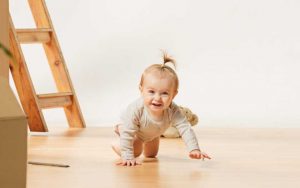
Most babies start to crawl when they can sit well without support, which most children can do by the time they’re six or seven months old. Crawling is your baby’s first way of getting around efficiently by himself. He’ll first learn to balance on the hands and knees before moving forward and backward from this posture by pushing off with his knees. After that, it’s just a matter of practice making perfect.
The best way to encourage crawling is to sit and call out to your baby or place toys just beyond your baby’s reach. As he gets better, you can also use soft toys and such to create obstacle courses for more challenges to help improve his confidence and agility.
Your baby will grow at an unbelievable rate, and before the little one gets mobile, it would be a good idea to childproof your house, with special emphasis on safety gates.
Not all babies will begin to crawl at the same age. If you’re worried though, that your child hasn’t gotten mobile by some means or another by the time he or she has reached the eighth-month mark, do bring it up at your next doctor’s appointment.
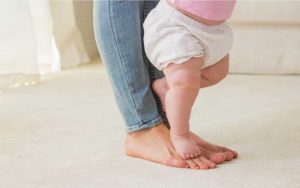
Babies generally begin to walk on their own around 12 months of age and are walking well by the time they’re 14 or 15 months old. Having said that, countless children don’t take their first steps until they’re 17 months or older!
At about eight months, some babies will begin to cruise along while holding onto furniture, followed by standing unsupported. A baby will attempt to pick up a toy from a standing position which leads bending those little knees, and also learns to sit down from a standing position.
Learning to walk is a huge step towards independence for any child. As soon as the little one advances from standing propped up against the couch to wobbling his or her way to your waiting arms to outrunning you, it’s time to brace yourself for the toddler years!
You can do your part in encouraging junior to walk by standing or kneeling in front of him and holding out your hands, or by holding both his hands and walking him towards you. You can even try a toy or contraption which he can hold onto and push – There are such toddle toys that are stable and have a wide base of support.
Late does not mean Abnormal
Although certain milestones during the developmental stages are generally achieved at similar ages, it’s not unusual for a healthy, “normal” baby to fall behind in some areas or race ahead in others. Parents need to understand that, to resist comparing the little one with other babies. You can always talk to your child’s health care professional if you are concerned about your baby’s development in any way.


